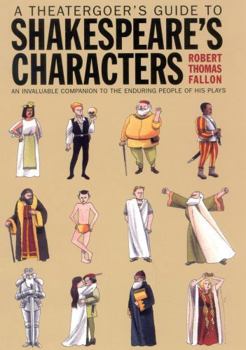A Theatergoer's Guide to Shakespeare's Characters
Select Format
Select Condition 
Book Overview
Following on his successful Guides to the plots and themes of Shakespeare's plays, Robert Fallon now explores the world of characters created by the Bard. Like Mr. Fallon's earlier books, A Theatergoer's Guide to Shakespeare's Characters is designed to enhance the playgoer's enjoyment of a performance, but it also makes for enlightening reading after the show. Intended for the general reader, it is written in plain but not inelegant English and avoids the specialized language of the theater and the academy. More than eight hundred characters appear in Shakespeare's thirty-eight plays--an astonishing variety of kings and queens, mothers and fathers, clowns and fairies, peasants and dukes, villains and heroes, the young and the old, the sinning and the sinned against. How could he have known so many in his diverse culture and portrayed them so convincingly? Mr. Fallon has chosen some sixty of these figures to examine. With few exceptions, they are the ones that modern theatergoers are most likely to encounter in performance, those that have captured the imagination of audiences over the centuries: Lear, Hamlet, Cleopatra, Rosalind, Portia, and the like. But some lesser-known characters are offered for their inherent interest and their example of Shakespeare's "infinite variety." Mr. Fallon locates each of them in the story of their play, relates them to other characters, shows how they change (or don't), and sums up their character and nature. Readers of his other Guides know they will find in Characters an entertaining and useful appraisal. "This book is as handy as they come...distilled without being dunderheaded--reader-friendly in the extreme."--American Theatre (on A Theatergoer's Guide to Shakespeare)
Format:Hardcover
Language:English
ISBN:1566635705
ISBN13:9781566635707
Release Date:March 2004
Publisher:Ivan R. Dee Publisher
Length:320 Pages
Weight:1.35 lbs.
Dimensions:1.2" x 6.3" x 9.1"
Customer Reviews
2 ratings
Theatergoers Guide to Shakespeare's Characters
Published by Thriftbooks.com User , 18 years ago
This book was a gift to my 17 year old granddaughter, a high school senior. I have asked for her review. She thought it an excellect book, well-written with in-depth studies of many of the characters. In fact, she thinks this book has encouraged her to become a Shakespeare scholar.
Shakespeare holds up a mirror so that we see ourselves ...
Published by Thriftbooks.com User , 20 years ago
Someone has calculated that more than eight hundred characters appear in Shakespeare's 38 plays--an astonishing variety of kings and queens, fairies and witches, jesters and fools, peasants and dukes, villains and heroes. In A Theatergoer's Guide to Shakespeare's Characters, Robert Thomas Fallon, professor emeritus of English at La Salle University in Philadelphia, has chosen some sixty of these figures to examine. "Aside from Shakespeare's extraordinary poetic powers," he writes, "it is the range and depth of his characters that is most astonishing." The author admits that any such survey is bound to be inadequate: "Aside from the sheer numbers, the range and depth of them is so rich, so vast, so varied, that mere summary must fall short of satisfaction." Fallon points out that Shakespeare never leaves us entirely comfortable with a character, never able unconditionally to reject his villains or embrace his heroes: "His figures have familiar human flaws that often impel them to tragically destructive acts, but at the same time they appeal to our sympathy precisely because those flaws are so very human and familiar." For example, Coriolanus is insufferably arrogant, but he is a valiant warrior devoted to his country. Othello is a vengeful murderer eaten with "the green-ey'd monster" of jealousy, but he never entirely loses the aura of "the noble Moor." Macbeth is the story of a good man gone wrong. We witness his tragic decline into evil, a man egged on to wicked deeds by Lady Macbeth, much as King Ahab was encouraged by Jezebel to persecute the prophet Elijah. Hamlet, his "native hue of resolution / Is sicklied o'er with the pale cast of thought," is distressingly indecisive and profoundly contradictory. As the British novelist Anthony Trollope put it, "When men think much, they can rarely decide." Nevertheless, Hamlet is finally moved to action when confronted with the task of killing his stepfather. Hamlet, says Fallon, is "Shakespeare's most exasperating tragic character. . . . Hamlet defeats us." Romeo is impulsive and hotheaded, but he is young and we tend to wink and forgive him his youthful excesses. Although Brutus is "the noblest Roman of them all," he joins a conspiracy to assassinate Caesar. Othello shows how Shakespeare unmasks the tragic dual nature of mankind, portraying the human spirit as at once noble and brutish: "We, like the Moor, are gifted with the capacity to conceive a soaring vision of joy and fulfillment, but, again like him, we can be reduced to primal rage when those riches are snatched from us. Both a lesser angel and a greater ape, we swing precariously between the two natures, unwilling to surrender the one and unable to subdue the other." Unconcerned with taking a position on ideological issues, Shakespeare's purpose in these plays is to "hold as 'twere a mirror up to nature," to record the "abstracts and brief chronicles of the time." Declining to pass moralistic judgments on his charact





